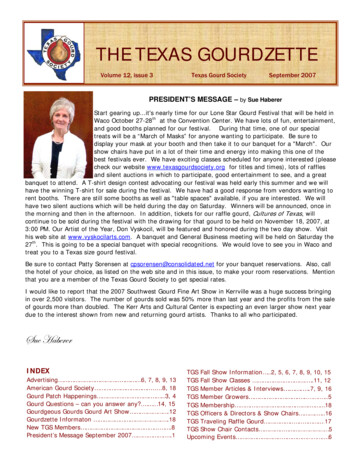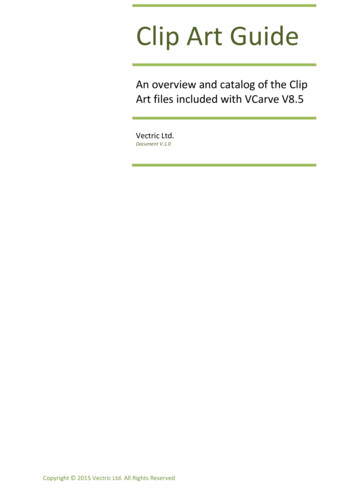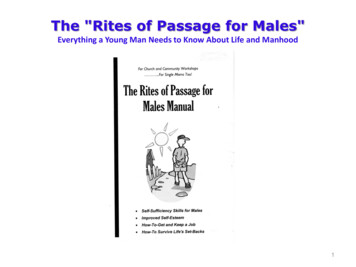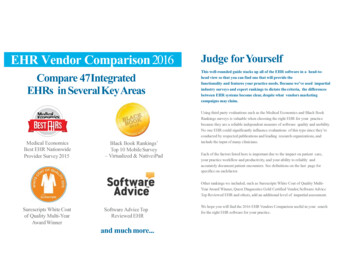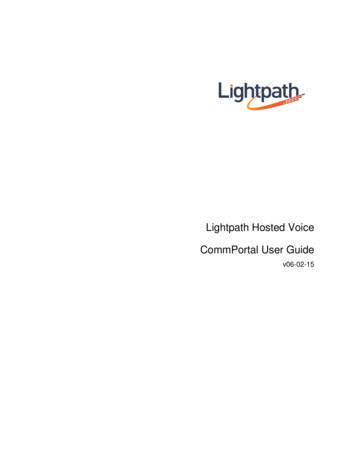
Transcription
IntroductionA Quick Note from RobertThroughout history, cultures have tightly grasped their dearly held beliefs so commonly accepted, soreligiously observed, that to question them is sacrilege. They are so sacred that to call these beliefs scamsis to doom oneself to isolation and abuse. When it comes to money, these scams have toppled everypast fiat government in history.Our culture is no different. Our beliefs are no less sacred. The beliefs and scams are so sacred andhold so much power that when they are wrong their damage is immense. These scams assisted in thecrisis of 2007.When the global financial crisis began in 2007, many people clung even more tightly to theirsacred beliefs and their jobs in the hope of not being one of those who were laid off. Millions held ontightly to their homes, even though they could not pay the mortgage. Most cut back on their spendingand saved more, even though the federal government was printing trillions of dollars, destroying thepurchasing power of their savings. Workers stuffed even more money into their retirement plans, eventhough the stock market had crashed, wiping out their prior gains. And school enrollments boomed,as more people headed back to school, even though unemployment was soaring. The faith in the scamsheld strong. What else could people do?The crisis did not have the effect of causing people to question the causes and the beliefs thatcreated the crisis. Instead people clung to the lies, their job and the system-wide scams that created theproblem. Rather than let go, most people clenched their fists tighter and waited for the crisis to pass,praying that their political leaders could solve the global crisis and that happy days would return.The problem is that this decade (2010 –2020) will prove to be the most volatile, world-changingin history.Unfortunately, the people clinging to the relics of the past—relics such as job security, savings, a home,and a retirement plan—will be those who are most ravaged by the coming global financial storm.A few know they must make changes. Yet without a strong financial education, they do not knowwhat to do or how to change.The Rich Dad Company’s vision has always been to provide comprehensive financial educationwith quality, free resources to as many people as possible. The goal of this eBook is to take you fromthe established mindset about money to the enlightened mindset, to put a bullet to the head of badfinancial advice, and to help you take charge of your financial future.Comprehensive financial education is still the surest way to financial freedom, both personally andas a society. Together we can make a difference.1
Chapter Onescam #1:Higher educationThe “School Success” ScamWhen I was young, my poor dad always told me the best path to success was to go to school.He felt that was the best way to get a good job. The problem was that my poor dad was one of themost educated people I knew, but he was always complaining about money and how unhappy hewas with his work.My rich dad, on the other hand, didn’t have a college degree. Yet he was very successful andvery wealthy. Rich dad said, “School teaches you to be an employee. If you want to be rich, don’tcount on school.”From a very young age, I learned that higher education did not translate into success and it was one ofthe biggest scams around. This scam is the foundation upon which the other scams are built. So, I decidedto begin this eBook by challenging one of the pillars of most people’s beliefs.Going to School Doesn’t Make You Financially SmartI’m outspoken against the school system and it often brings accusations that I am anti-education.Nothing could be further from the truth. Unfortunately, “go to college” is one of those things peoplepoint at as a way of being successful without ever stopping to think if it’s true.The scam that school is essential to achieving success is perpetrated everywhere and all the time.What will make you successful is not going to school but rather financial education—learning howmoney works and how to make it work for you—is what will make you successful. Unfortunately,you can’t get that in school.When it comes to money, going to school won’t make you smart.Understanding ValueThis doesn’t mean that education isn’t important. The basic education you get in your K-12 yearsis important to everything that comes after. If you want to be a teacher, a lawyer, or a doctor, thenobviously you’re going to need to go to college.3
Chapter OneIn spite of all those years of school, it’s unfortunate that you won’t learn how money works.Education, particularly in America, doesn’t teach students how to live or be self-sufficient. Instead, itteaches us to be employees instead of our own bosses. It makes us workers instead of innovators. That’sa big reason why we call school a scam. In fact, the ultra-rich use school to keep poor people poor.Different Types of IntelligenceOne of the worst things about school is that it recognizes only one type of intelligence—booksmarts. If you aren’t book smart, you are very quickly labeled stupid. As a child, I was not book smart,and I was labeled stupid. I wasn’t stupid; I was just interested in different things and I was bored. Forinstance, no one could tell me when I’d ever use calculus in my real life! Yet, I was told to comply andlearn. I was being trained to be an employee.My rich dad wasn’t book smart either. Yet, he was very smart. He had street smarts, which he usedto become very wealthy. School doesn’t teach you to be street smart. I had to learn that from my richdad. My poor dad thought school was incredibly important, and he was very book smart. But what didit get him? He struggled financially most of his life.That’s another reason why we label higher education a scam. The so-called experts tell you thatyou need it. They tell you it’s important. The unfortunate fact is it doesn’t actually do anything for youexcept make you a good employee.“But I studied money in college!”Tom Wheelwright, my Rich Dad Advisor on taxes, went to school to be an accountant and gotstraight A’s. He will also gladly tell you that he got no practical financial education. He learned what wasneeded to do a job but not how to successfully manage his own finances. This is absolutely laughable sincehe went to school to learn about money!People often say they learned about money in school. You may learn how to balance a checkbookor what a P/E ratio is in school, but you won’t learn how money really works. That’s not an accident;it’s a scam.The ultra-rich use school to train us to be good employees. We start out being told what to do andwe are rewarded for compliance. It’s very easy to transition from a school to a company where you’retold what to do. That leads us to trust and hand things off to the government and the ultra-rich bankerswho handle our 401(k). The ultra-rich use education to make themselves richer and keep you poor.When you realize that, it’s not hard to see why it’s listed as one of our scams.4
8 Rich Dad ScamsThink for YourselfThe people who fall for scams are typically those who are conditioned not to think forthemselves. Unfortunately, the first scam on our list, Higher Education, robs us of the independenceto think for ourselves, to think like an entrepreneur, an innovator, and an investor. It instead teachesus to be dependent.You need to learn to speak the language of money to be successful. That takes financialeducation, which opens up a whole new world, a world where you can succeed on your own terms.Unfortunately, our schools don’t teach that language. They teach you the basics, and then they eitherteach you a specific trade or skill, or they simply train you to be an employee.Today, it’s time to start thinking for yourself. Don’t fall for the scam of higher education. Instead,start your financial education today, and begin your journey to financial freedom.5
Chapter Twoscam #2:Get a jobWe see scams every day. Sometimes they are easy to see and call out, like spam emails that promiseriches in exchange for your bank information. But some scams are a lot harder to spot. From my richdad, I learned financial smarts, which taught me how to spot scams—and how to not be taken in.Unfortunately, without those financial smarts, it can be very easy to be taken in by scams, especiallythe scams that the ultra-rich use to keep the poor in their place.To break away from those scams you usually need someone else to warn you that you’re beingduped, to tell you that you’re being taken advantage of, and to tell you what you can do about it.The Big One: You Need a JobWhen I was young, my poor dad always told me that I needed to go to school so that I could geta good job. To my poor dad, getting a good job was the most important thing in life. My poor dadworked very hard, but he was always worried about money. Yet, he never got ahead. His job was oneof the things that actually kept him from succeeding. He toiled away working for others, often gettingraises only to keep up with the cost of living and paying a high percentage to the government in taxes.On the other hand, my rich dad never had a “real” job, and he was very successful and very wealthy.My rich dad understood that the sentiment, “Get a job,” was a scam. Rather than get a job, he createdjobs. Rather than work for someone else, he worked for himself. Rather than pay high taxes, he used thetax code to become wealthy.How the Scam Works“Get a job” is a scam because you have no control over your income and it makes you poorer due tohaving to pay the most in taxes.Guess who isn’t paying a lot in taxes (as a percentage)? The owner of the business you work for. Thescam gets even worse when you look at it long-term. If you do well at your job, if you claw your way upthe ladder, what is your reward? A small increase in pay and a bigger increase in taxes.It gets even worse if you work for yourself. You pay the highest taxes in the form of selfemployment taxes.6
Chapter TwoThe only way to avoid this is to be the owner of a big business or to be an investor and put yourmoney to work for you. That’s where the wealthy work and live. The system is set up to benefit theultra-rich so they can keep their money while making sure you keep getting taxed.The Tax ScamWhen you realize that taxes are a way of keeping you in your place, you can see that this scam isreally just an extension of the scam, “Go to School.” It’s in school that you learn to be a good employee,that if you work hard you can succeed. In reality, you can’t, not on those terms.The government gives tax breaks to those people they identify as creating jobs: entrepreneurs andbig business owners. They want the private sector to develop real estate, start companies, and generatewealth. The government rewards that. In return, the government expects employees to pay taxes thatcover things like Medicare and Social Security.Some people argue that employers pay these taxes too, but really what they are doing is usingmoney that would otherwise pay you to pay their share of the taxes.False SecurityThe idea that a job is an important part of your personal security is a big part of scam #2, “Get aJob”. The reality is that having a job does not make you secure. You only need to look at the state ofour economy or turn on the news to see that people are losing their jobs or are underemployed. In aneconomy where people are losing their jobs, the more secure position is to own the company that isfiring people.Stepping AwayMy poor dad, just like most people, was conditioned and taught from the day he was born to be anemployee. My rich dad broke away from that thinking and was an entrepreneur. He put his money towork. He was on the side of the rich, the side protected by the government. But how do you get there?The first answer is simple. You do it by increasing your financial education and thinking like anentrepreneur instead of an employee. When you do that, you break out of the rat race. You realize thateverything you’ve been taught about getting a job and finding success is a lie, and that there is anotherway—a better way that actually works. And that’s the secret the ultra-rich don’t want you to know.7
Chapter ThreeScam #3Work hardPeople often talk about a scam as a con. Con is short for confidence. A con man can only dupeyou if you put your confidence in him. When I talk about the scams designed by the ultra-rich to keepyou poor, one of the hardest things to get past is that so many of us have been taught to believe withconviction and confidence that these scams are true. And the conning started so young that we neverhad a chance to think differently.That’s the difference between thinking like my poor dad, who did what he was told and died poor,and thinking like my rich dad, who was financially educated and grew rich based on his knowledge ofhow money worked.This chapter is about one of the biggest, most-ingrained scams: If you work hard, you willbe rewarded.Don’t Work HardMy poor dad worked hard all his life. He went to school because he was told to. He got a job becausehe was taught that was what you have to do. He worked hard because that was what he was supposed todo. Yet, he struggled financially his whole life, and often he was not happy.When it came to working hard, my rich dad liked a story from Mark Twain’s The Adventures of TomSawyer. Tom runs a con job on the kids in his neighborhood. His job is to paint a fence, and he makesit look like so much fun that all the other kids offer to pay him to do the work.Rich dad said, “Rather than work hard, I work smart. Smart work is getting others to not only dobut also want to do hard work for you. And smart work is also getting money to work for you, not theother way around.”Why Hard Work Doesn’t WorkIt seems like a simple math equation: effort reward. You work hard, you earn more, you get morefor your effort, and it seems like it should work. Once upon a time, it may have worked
Created Date: 6/13/2014 1:42:25 PM

